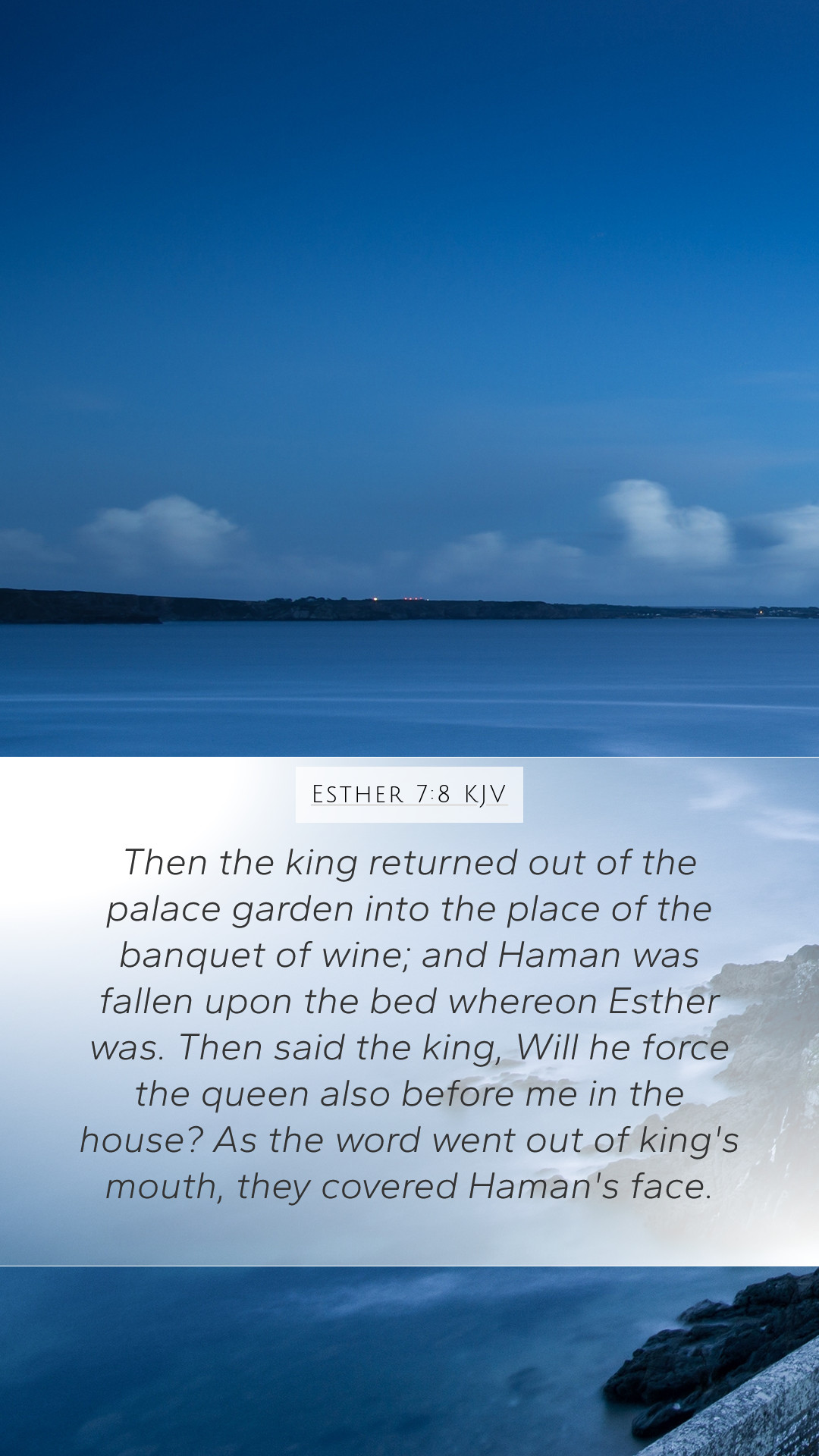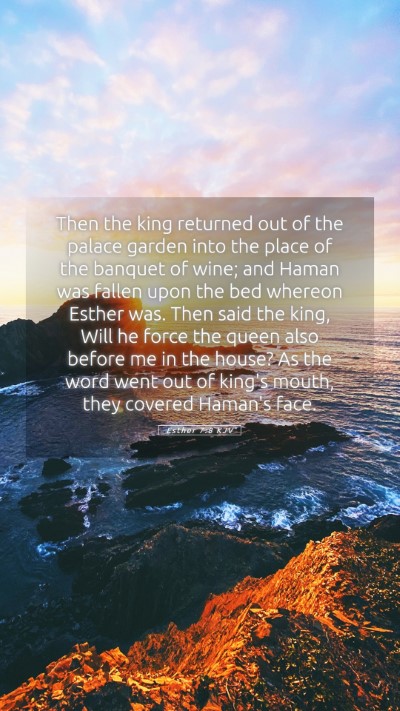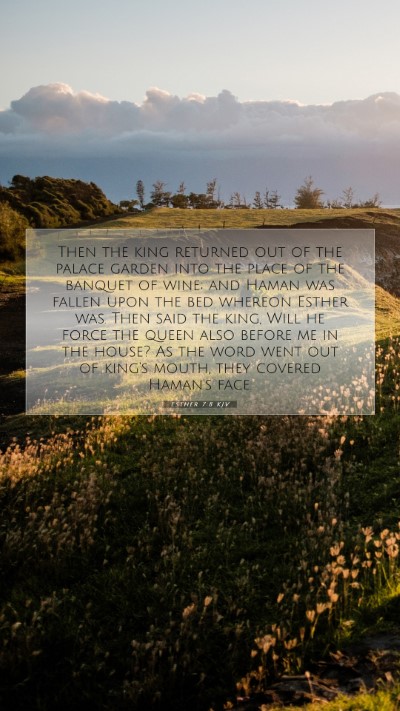Old Testament
Genesis Exodus Leviticus Numbers Deuteronomy Joshua Judges Ruth 1 Samuel 2 Samuel 1 Kings 2 Kings 1 Chronicles 2 Chronicles Ezra Nehemiah Esther Job Psalms Proverbs Ecclesiastes Song of Solomon Isaiah Jeremiah Lamentations Ezekiel Daniel Hosea Joel Amos Obadiah Jonah Micah Nahum Habakkuk Zephaniah Haggai Zechariah MalachiEsther 7:8 Meaning
What is the meaning of Esther 7:8?
Then the king returned out of the palace garden into the place of the banquet of wine; and Haman was fallen upon the bed whereon Esther was. Then said the king, Will he force the queen also before me in the house? As the word went out of king's mouth, they covered Haman's face.
Esther 7:8 Bible Verse Meaning
Understanding Esther 7:8
Esther 7:8 is a pivotal moment in the narrative of Esther, marking the climax of a dramatic conflict between good and evil. The verse reads:
"Then the king arose in his wrath from the banquet of wine, and went into the palace garden: and Haman stood up to make request for his life to Esther the queen; for he saw that there was evil determined against him by the king."
Bible Verse Meaning
This key passage captures the moment when King Ahasuerus shows his anger towards Haman, who plotted against the Jews, particularly targeting Esther's people. The implications and emotional weight of this verse unravel through various commentaries.
Insights from Public Domain Commentaries
Matthew Henry
According to Matthew Henry, this verse illustrates the irony of Haman's downfall. After plotting the annihilation of the Jews, Haman finds himself in desperate need, pleading for mercy from Esther, whom he had previously underestimated. Henry emphasizes the theme of divine justice, noting that Haman's actions have brought about his own demise.
Albert Barnes
Albert Barnes gives an interpretation that highlights the emotional turn of events. Haman, once elevated to a position of power, now faces the bitter reality of his conspiracy unraveling. Barnes notes that Haman’s desperation is evident as he pleads for his life, showcasing how fortunes can change swiftly under divine providence.
Adam Clarke
Adam Clarke's commentary points out the significance of the setting—the king’s garden symbolizes peace and tranquility, contrasting with the chaos Haman faces. Clarke remarks on the psychological aspects at play, focusing on Haman's fear and royal wrath as pivotal factors leading to the resolution of the conflict.
Scripture Analysis
Examining Esther 7:8 in broader context reveals important themes:
- The Role of Providence: The narrative demonstrates God's guiding hand in the affairs of men, orchestrating events for the protection of His people.
- The Downfall of the Wicked: Haman’s fate serves as a warning against pride and malice, echoing the biblical principle that those who plot evil shall ultimately reap what they sow.
- The Power of Intercession: Esther’s position as queen places her in a unique role; her actions lead to a critical turning point not only for her people but also for the fate of Haman.
Application of Esther 7:8
For modern readers, the application of Esther 7:8 extends beyond its immediate context. Here are several ways to interpret and apply its meanings:
- Understanding Justice: The verse encourages believers to trust in God’s justice, assuring that evil schemes do not go unnoticed.
- Role of Courage: Esther’s courage in standing for her people is an example for individuals to advocate for justice in their communities.
- Facing Consequences: Haman’s demise serves as a reminder that every action has consequences; our decisions reflect our character and moral alignment.
Related Bible Verses
Esther 7:8 has thematic and contextual links with several other scripture passages:
- Proverbs 11:5: “The righteousness of the perfect shall direct his way: but the wicked shall fall by his own wickedness.”
- Esther 3:6: “And he thought scorn to lay hands on Mordecai alone; for they had showed him the people of Mordecai: wherefore Haman sought to destroy all the Jews that were throughout the whole kingdom of Ahasuerus.”
- Galatians 6:7: “Be not deceived; God is not mocked: for whatsoever a man soweth, that shall he also reap.”
Conclusion
Esther 7:8 encapsulates the tension and turning of events that demonstrate God's faithfulness and justice. By understanding this verse through the lenses provided by public domain commentaries, we can gain deeper insights into its significance and apply its lessons to our lives. Whether engaging through personal study, group discussions, or academic study, the richness of this scripture is both encouraging and enlightening.


